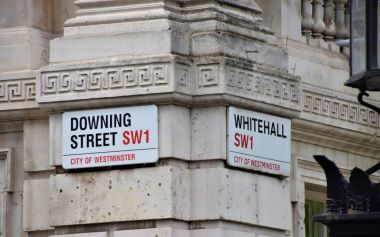
I had a dream last night. In it I found myself ushered into Number 10 Downing Street, surprisingly as the new Prime Minister. I passed a line of men and women respectfully acknowledging me and was shown into an oak-panelled room. As I sat down behind a vast desk, an elderly gentleman in a smart pin-striped suit closed the door and stood before me, the model of cool, respectful duty.
‘My task, Sir, as Senior Secretary, is to help you settle in.’ The voice was formal and without warmth.
‘Thank you. Is there any coffee?’
‘Greek, Sir. As you prefer.’ From somewhere a cup appeared and I sipped on it.
‘Take some notes,’ I said.
‘As you wish, Sir,’ said the secretary, stiffly taking a seat and producing a pad of paper.
‘Now I want to put together a cabinet of those who are competent, trustworthy, wise and have experience of what they are to be responsible for. And who have no mixed motives or agendas.’
A frown crept across the secretary’s face but he said nothing and wrote the words down.
‘And I want them to be honest with me. To disagree with me when I’m wrong. I want to know the truth.’
‘The truth, Sir?’ The word seemed unfamiliar to him.
‘I want to encourage and reward those who work on the frontline in hospitals, schools, police. I want to set them free from form-filling and the numerous levels of administrative bureaucracy.’
‘You would put lots of administrators out of work, Sir.’
‘Let them plant trees.’
Fortified by the coffee I felt I was beginning to get into the swing of things. ‘I want to reward people who heal people and who serve the community. I want people to know they matter. And I want a zero approach to corruption and dishonesty. Penalties for cheating the country. And for distorting the truth or the press fabricating untruths.’
‘If I might point out, Sir, the prisons are full.’
‘Give them bright orange uniforms. Put them on the streets cleaning up graffiti and picking up rubbish.’
‘They won’t want to do it, Sir.’
‘For every day they work they can have a day reduced from their sentence.
‘And I want a culture where people want to give things away, rather than keep them or accumulate more.’
There was an awkward pause. ‘I see, Sir.’
‘Oh, and can we have a written constitution?’
‘You’d need to talk to the King about that, Sir.’
‘I will. I also want to talk to the leaders of the opposition. Let’s set up a lunch meeting.’
‘About what, Sir? It’s not customary. They lost.’
‘About long-term issues. Education, energy, environment, health care. Seek consensus.’
‘Consensus, Sir?’
‘It’s a Latin word. Opposite of conflict.’
I sensed a hidden irritation.
‘I want to look into moving parliament. From London. Put it somewhere central – Birmingham. And have a new building with an arc of seats so that we don’t all sit confronting each other.’
‘Innovative.’
‘Oh, and the bishops.’
‘The bishops?’
‘I want to find the ones who don’t preach what they are supposed to uphold. And sack them.’
‘I see.’
I paused. ‘That will do to start with.’
The Senior Secretary reflected for a moment. ‘If I may say so, Sir, you want to change the country, don’t you?’
‘Exactly.’
‘I just wondered, Sir, whether perhaps . . . just perhaps . . . you might be in the wrong profession. As Prime Minister, that is.’
‘Please explain yourself.’
‘Well, Sir, it is the wisdom of politics to know the limits of political power. Prime ministers appear to direct the nation but, in reality, they don’t change it.’
‘They don’t? So who does change the nation? Give me examples.’
‘Well, the classic example is in the 18th and 19th centuries, when those who changed how the nation thought and lived were the preachers, the evangelists and social reformers. John and Charles Wesley, George Whitefield, William Booth, Elizabeth Fry and Josephine Butler. Their work did what politics couldn’t do.’
‘What a thought!’ I said. ‘You’d better give this job to someone else.’
And with that I woke up!